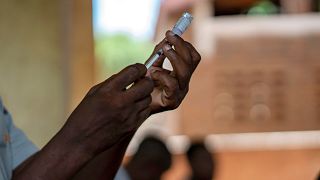Mali
Two centuries have elapsed since the creation of braille, a tactile writing system that has significantly changed the lives of countless individuals who are blind or partially sighted.
In Mali, many individuals credit braille with helping them achieve literacy and gain independence.
The nation, like much of West Africa, has faced ongoing challenges in integrating those with visual impairments into society.
Amadou Ndiaye, a social worker who lost his sight during childhood, expresses how learning braille has expanded his horizons.
He plays chords on his guitar, highlighting how this tactile system has been instrumental in nurturing his passion for music.
"Braille, touch, it's really tactile development," he explains, reflecting on how it has enabled him to pursue his love for playing the guitar.
At his job, Ndiaye carefully navigates the raised dots on a sheet of paper, interpreting the world around him despite his visual limitations.
He emphasizes the transformative impact of braille on his life, stating, "Braille helped me live my life."
In a country with over 20 million residents, where approximately 170,000 people are estimated to be blind, the Institute for the Blind in Mali plays a crucial role in helping students like Ndiaye overcome educational obstacles and prepare for a future where they can compete for jobs alongside their sighted peers.
Dicko is visually impaired. He utilizes a specialized typewriter to produce braille texts for his students. However, he believes his students still face significant challenges.
"We are experiencing a shortage of teaching materials," Dicko explains, noting that he has only one braille reading book available for his entire class, which consists of many students.
Despite the emergence of new technologies, some individuals who are blind or partially sighted remain hopeful that these advancements will help eliminate educational obstacles.
Moussa Mbengue, a program officer for inclusive education at Sightsavers in Senegal, points out that while technology has progressed, it does not match the impact that braille had two hundred years ago.
"It cannot replace braille. Instead, I see technology as a complement to braille," he states.











Go to video
Jihadi activities increase sevenfold in Kayes region, near east of Senegal
01:13
Iran displays new military tech as Nuclear talks loom
00:55
Meta faces antitrust trial over Instagram and WhatsApp acquisitions
01:04
Algeria suspends flights to Mali over airspace violations
Go to video
Sahel alliance recalls ambassadors from Algeria over Malian drone downing
00:55
Niger withdraws from the International Organisation of La Francophonie